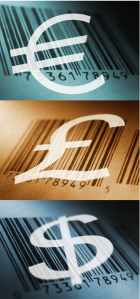Most of the companies I deal with are wholesalers, distributors or online retailers (eCommerce) - or some combination thereof. And many of these companies are dealing in more than one currency. Several US customers purchase product for resale from Germany, the UK, France, etc. and have to pay suppliers in Pounds or Euros. And virtually all our Canadian customers are working in Canadian and US dollars, frequently on both purchase and sales transactions.
Now, keep in mind that most of the these companies are owner-managed entrepreneurial companies. And given that many entrepreneurs are at least to some extent risk-takers, it should come as no surprise that many of these business owners tend to gamble on exchange rate fluctuations. And yet is does surprise me, or moreover it's a cause for concern in some cases.
The problem is that, in most instances, the business owner is not a financial or currency management expert, and is effectively doing nothing more sophisticated or intelligent than gambling. Yes, that's right folks - it's gambling. Let's say you purchase a shipment of products for, say, €50,000, and you don't hedge the exchange rate - you have 60 days to pay the supplier and you figure the dollar is strengthening, so you'll wait. Meanwhile, your salespeople are making pricing decisions, and you're looking at profitability reports, based on the cost expressed in dollars, calculated at the rate prevailing when the shipment arrives (or even worse, when the order was placed). So if you're lucky, the dollar does move the right way and you score. But equally likely, perhaps even more, there's some event that turns the dollar downwards and now, 5 days before due date for payment, the dollar starts heading downwards. You still haven't bought Euros, so do you buy now to limit your exposure? Or do you wait it out and hope that it turns around in the next 3 weeks or so? And if you do that, what if it declines even more?
There's no right answer here, but agonizing over it will deflect your attention from what you should be doing - namely managing your business, focusing on sales, merchandise, personnel, inventory management etc. But instead you're trying to make currency trading decisions that people who do this full-time, every day, still get wrong much of the time. And even if you do get it right this time and make a small profit on the exchange rate, that will just entice you to take even more risk next time. It's like to person who wins big at roulette one night, and gibes it back with interest the next.
The smart business owner will generally fix the currency exchange rate for a transaction early, and focus on running the business. And when you feel the impulse to gamble, take a trip to Vegas.










